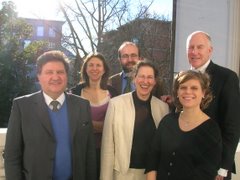Interesting conference (in Italian) at USI
I mercoledì dell'ISI. Per il ciclo di conferenze pubbliche "Corpi e corpuscoli":
Il lume di una candela
Marco Maggi
Campus di Lugano, Auditorio
4 marzo 2009, ore 18:00-19:30
«Il mondo va in fretta, il secolo si accelera. Non è più tempo di lucignoli e candelabri. A oggetti desueti ormai non si accompagnano che sogni superati» (Gaston Bachelard). Dinanzi al lume rimane a sognare, nel Novecento, la poesia. Sogni intessuti di memoria, come constata Montale: «Il ricordo è un lucignolo, il solo che resta»; non per questo sogni superati, se in quel «semplice lume» (Par., XXXIII, 90) balugina, promessa di futuro, la «luce dell’U-topia» (Paul Celan). Nel cono proiettato dall’immaginario della «piccola luce» si profila la situazione della parola poetica nel tempo presente.
***
Marco Maggi ha compiuto studi di letteratura e filosofia a Milano (Università Cattolica) e Ginevra, perfezionandosi all’Istituto per gli studi filosofici (Napoli) e all’Institut d’Études littéraires del Collège de France (Parigi). È membro del comitato di redazione della «Rivista di storia e letteratura religiosa». Le sue ricerche vertono principalmente sulla letteratura italiana del Seicento, sulla letteratura umanistica, sui rapporti tra la letteratura e le arti. Ha pubblicato l’edizione dell’inedito Vocabulario italiano di Emanuele Tesauro (Firenze, Olschki, 2008), la monografia Aurore barocche (Torino, Aragno, 2006), il catalogo dei libri antichi di Natalino Sapegno e Giulio Augusto Levi (Torino, Aragno, 2001). Tra i suoi saggi apparsi su riviste e volumi collettivi, l’edizione del catalogo della biblioteca di Emanuele Tesauro («Lettere Italiane», 2001/2). Accanto agli studi secenteschi – attualmente coltivati sulle relazioni tra letteratura spirituale e musica – ha di recente intrapreso una ricerca su Leopardi e le immagini bibliche dei patriarchi.

